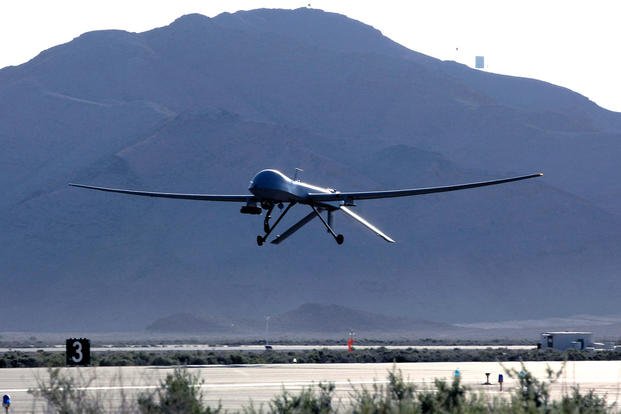A lightning strike brought down an MQ-1B Predator drone last year over Iraq, according to the Air Force.
An Air Combat Command accident investigation board report released Thursday said the Predator, forward deployed from the 432nd Wing at Creech Air Force Base, Nevada, crashed on Oct. 17, 2015, after "experiencing electronic systems failure and loss of control due to a lightning strike."
The remotely piloted aircraft was operated by a mission control element from the 20th Attack Squadron at Whiteman Air Force Base, Missouri, at the time of the accident.
"The effects of lightning induced high voltage throughout the wiring in the RPA's wings, damaging the left and right wing control modules," the release states. "With these components inoperative, the RPA was unable to maintain controlled flight and impacted the ground."
Two Predators crashed within days of each other last year -- one over Iraq, the other over the Syria-Turkey border region.
On Oct. 17, 2015, "a Predator crew reported a lost link and subsequent crash while the Predator was flying southeast of Baghdad," said Col. Steve Warren, then-spokesman for Operation Inherent Resolve.
Warren told reporters at the Pentagon over a video feed at the time that "the drone was recovered by local Iraqi police in the vicinity of al-Kut. The local police returned it to coalition control. There were no injuries and an investigation into the cause is underway."
A second Predator crashed in southern Turkey on Oct. 19, 2015, after experiencing a mechanical failure, according to Stars and Stripes. Operators were able to maintain control of the drone before bringing it down in an unpopulated area, said a statement at the time from U.S. Air Forces Europe-Africa.
The MQ-1B crash in southeast Baghdad cost the Air Force $5.2 million, the release states. The aircraft was destroyed on impact.
The investigation also found that the pilot navigating the drone "misidentified" the weather pattern in the area, which subsequently "contributed to the mishap," the report states.
-- Oriana Pawlyk can be reached at oriana.pawlyk@military.com. Follow her on Twitter at @Oriana0214.




























